C. 3:List
| Press to select the menu of choice. |
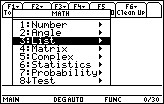 |
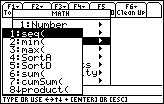 |
Not all options are given in the entry format. Options that are used frequently will be included, but others are omitted from the table. For a complete format listing, you can check the TI-89 manual. Results in complex mode are not covered. They can be found in the manual.
|
Operation |
Entry Format |
Explanation |
Screen |
| 1:seq | seq(expression, var, low,high [,step]) | Returns a sequence
of values. Sequence begins at "low" and runs through "high". The default for the step is 1. |
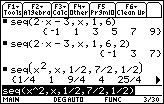 |
| 2:min | min(expression1,
expression2) min(list1,list2) min(matrix1,matrix2) |
Returns the minimum
of two arguments. |
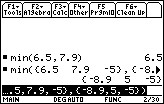 |
| 3:max | max(expression1,
expression2) max(list1,list2) max(matrix1,matrix2) |
Returns the maximum
of two arguments. |
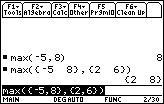 |
| 4:SortA | listName1[,listName2],... | Sorts the elements
of the first argument in ascending order. The list must be named first; then sort the list; then you can display the list. |
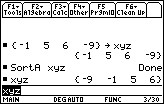 |
| 5:SortD | listName1[,listName2],... | Same as SortA,
except that SortD sorts in descending order. |
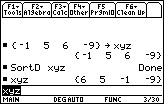 |
| 6:sum | sum(list) | Returns the sum of
the list. This can also be used to find the sum of a sequence. |
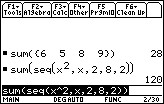 |
| 7:cumSum | cumSum(list) | Returns a list of
the cumulative sums of the arguments in the list. It begins at the first element. |
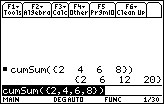 |
| 8:product | product(list) | Returns the product
of the elements in the list. |
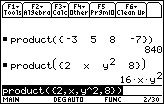 |
| 9:left |
left(sourceString [,num]) |
Returns the leftmost
"num" of characters in a string. The default is the entire string. The " key is |
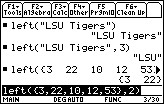 |
| A:mid | mid(sourceString,start [,count])
mid(sourceList,start [,count]) |
Returns "count"
characters from the list, beginning with element number start. |
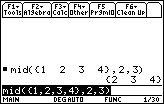 |
| B:right | right(list1 [ ,num]) | Returns the
rightmost "num" characters in the list1. |
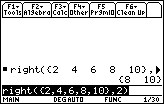 |
| C:polyEval | polyEval(list1,expression1 polyEval(list1,list2) |
Interprets the first
argument as the coefficient of a polynomial. The degrees should be descending. Returns the polynomial evaluated for the value of the second argument. |
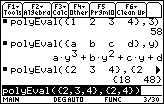 |
| D:list>mat | list>mat(list [,elementsPerRow]) | Returns a matrix
filled row by row with the elements in the list. The default for "elementsPerRow" is the number of elements in list. |
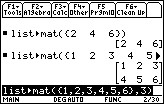 |
| E:mat>list | mat>list(matrix) | Returns a list
filled with the elements in "matrix". The elements are copied row by row. |
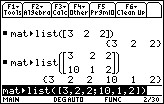 |